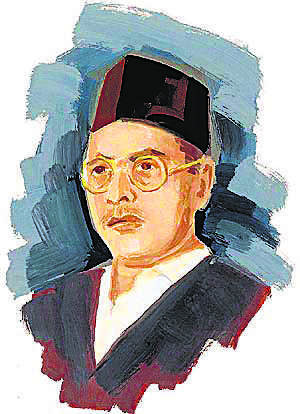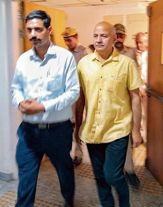
Illustration: Kuldeep Dhiman
Saba Naqvi
I am certain that it’s just a matter of time before Vinayak Damodar Savarkar gets the nation’s highest civilian honour, the Bharat Ratna. It would be a statement on an age that is more reflective of the Savarkar vision than any other, and certainly not that of Mohandas Karamchand Gandhi, whom Savarkar’s followers assassinated and he himself got away in the criminal case by a whisker.
If one is tasked with reading the literature of the Hindu right, Savarkar, founder of the Hindu Mahasabha, makes for far more interesting reading than the ideologues of the RSS. It is he who articulates the term Hindutva, speaks of a Hindu Rashtra and through his writings speaks of a need for revenge, mostly against Muslims, whom he sees as aggressors. Savarkar unambiguously sees the world as Us vs Them, so in that sense he does indeed speak for the age we currently live in.
What is the Hindu Rashtra that Savarkar advocates?
Till 2008, Nepal was the only Hindu kingdom in the world till it changed its Constitution. I would urge anyone who wishes to understand Hindutva political thinking not to buy hagiographies passing off as biographies, but just read Savarkar himself. His speeches as president of the Hindu Mahasabha are published as ‘Hindu Rashtra Darshan”. In his 1937 presidential address, he began with what he called a homage to the independent Hindu kingdom of Nepal and sent greetings to the king in holding out as a Hindu power. After more praise of Nepal, he proceeds to define Hindutva, explain what is a Hindu, and why people whose motherland and holy-lands are not the same, cannot be part of the Hindu nation.
Savarkar describes the Mahasabha as a Hindu Rashtra Sabha and says the Hindus are a nation by themselves. He then asks the valid question that ‘How the Hindus who differ so much amongst themselves in every detail of life could at all be called a nation as such?’ He gives a reply: “No people on earth are so homogenous as to present perfect uniformity in language, culture, race and religion. A people is marked out a nation by themselves not so much by the absence of any heterogeneous differences amongst themselves as by the fact of their differing from other peoples more markedly than they differ amongst themselves.” We know who the “other people” are; those whose motherlands and holy-lands do not lie in the boundaries of the nation-state.
Savarkar implores Hindus to be more united and martial and militant. He also reveals an admiration for one aspect of Islam. He saw the “unity of the faith and the valorous fervour” of Muslims as “qualities in which the Hindus proved woefully wanting”. One has to read him in the original to understand the depth of his hatred for Muslims — and it can also help us comprehend the politics happening all around us that is driven by an anti-Muslim sentiment, be it the politics of NRC, Kashmir, Ayodhya or even awarding Savarkar posthumously. It all comes from that same place in the hearts and minds.
Yet, we should remember that Savarkar’s basic thesis about Islam or religion being a force for unity was proved quite wrong in the case of Pakistan, whose very name means Land of the Pure, implying that those who are not Muslims are impure. Who are the Muslims accommodated in this imaginary homeland? First, they could not stomach the rule of Bengali Muslims, hence East and West were divided and Bangladesh born. Then, within the home of Muslims, Punjabis dominated and competed with Sindhis. Within Karachi, the Mohajirs ran a reign of terror even as they claimed discrimination. Shias, Ahmadiyas are all routinely targeted, the Pathans dragged into their own Great Game destiny and so on. It’s quite easy to prove that religion has not proved to be a force for unity in South Asia; West Asia seems even more afflicted by wars and rivalries among Muslim nations.
Savarkar undoubtedly had great influence in shaping the emerging Hindu nation in India and the ideas of the BJP that’s vanquished the old Congress establishment. Earlier this week, Union Home Minister Amit Shah made a speech at Banaras Hindu University where he again reinforced the importance of Savarkar and stated that history has always been written by victors and those who succeed in capturing power. The message is unambiguous.
We must, however, stop being hypocrites about Gandhi and recognise that India is in the process of honouring a man whose ideas inspired his murder. Sardar Patel, then Union Home Minister, certainly thought so and was convinced of Savarkar’s guilt. In a letter he wrote to Nehru on February 27 that year, he stated the following: “A fanatical wing of the Hindu Mahasabha directly under Savarkar murdered Gandhi.” For more on that crime, read the classic work by Manohar Malgonkar, The Men Who Killed Gandhi.



























